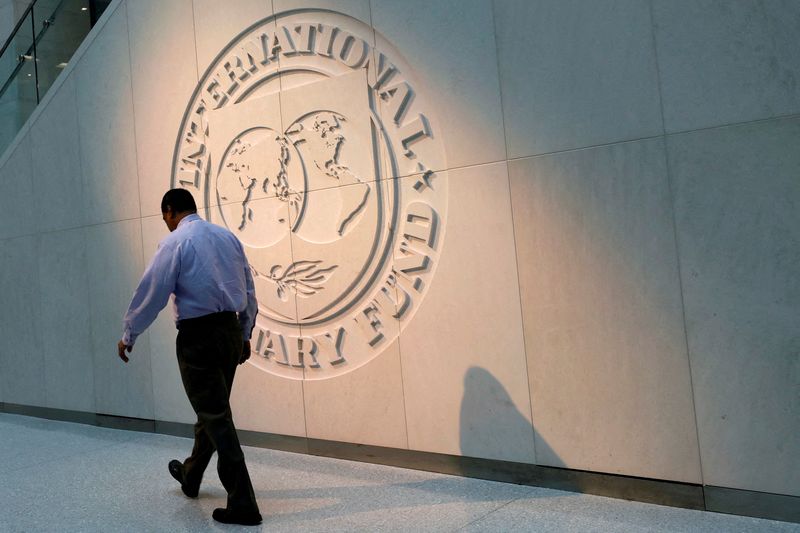By David Lawder
WASHINGTON (Reuters) - The International Monetary Fund on Tuesday trimmed its 2023 global growth outlook slightly as higher interest rates cool activity but warned that a severe flare-up of financial system turmoil could slash output to near recessionary levels.
The IMF said in its latest World Economic Outlook report that banking system contagion risks were contained by strong policy actions after the failures of two U.S. regional banks and the forced merger of Credit Suisse (SIX:CSGN). But the turmoil added another layer of uncertainty on top of stubbornly high inflation and spillovers from Russia's war in Ukraine.
"With the recent increase in financial market volatility, the fog around the world economic outlook has thickened," the IMF said as it and the World Bank launch spring meetings this week in Washington.
"Uncertainty is high and the balance of risks has shifted firmly to the downside so long as the financial sector remains unsettled," the Fund added.
The IMF is now forecasting global real GDP growth at 2.8% for 2023 and 3.0% for 2024, marking a sharp slowdown from 3.4% growth in 2022 due to tighter monetary policy.
Both the 2023 and 2024 forecasts were marked down by 0.1 percentage point from estimates issued in January, partly due to weaker performances in some larger economies as well as expectations of further monetary tightening to battle persistent inflation.
The IMF's U.S. outlook improved slightly, with growth in 2023 forecast at 1.6% versus 1.4% forecast in January as labor markets remain strong. But the Fund cut forecasts for some major economies including Germany, now forecast to contract 0.1% in 2023 and Japan, now forecast to grow 1.3% this year instead of 1.8% forecast in January.
ECONOMIES AND INFLATION RESILIENT
U.S. Treasury Secretary Janet Yellen told a news conference she was more optimistic about the outlook as a number of advanced and emerging market economies were showing resilience.
"I wouldn't overdo the negativism about the global economy," Yellen said. "I think the outlook is reasonably bright."
The IMF raised its 2023 core inflation forecast to 5.1%, from a 4.5% prediction in January, saying it had yet to peak in many countries despite lower energy and food prices.
"Monetary policy needs to stay focused on price stability" to keep inflation expectations in check, IMF chief economist Pierre-Olivier Gourinchas told a news conference.
In a Reuters interview, Gourinchas said central banks should not halt their fight against inflation because of financial stability risks, which look "very much contained."
BANKING TURMOIL SCENARIOS
While a major banking crisis was not in the IMF's baseline, Gourinchas said a significant worsening of financial conditions could recur as nervous investors try to test the "next weakest link" in the financial system as they did with Credit Suisse.
The report included two analyses showing financial turmoil causing moderate and severe impacts on global growth.
In a "plausible" scenario, stress on vulnerable banks - some like failed Silicon Valley Bank and Signature Bank burdened by unrealized losses due to monetary policy tightening and reliant on uninsured deposits - creates a situation where "funding conditions for all banks tighten, due to greater concern for bank solvency and potential exposures across the financial system," the IMF said.
This "moderate tightening" of financial conditions could slice 0.3 percentage point off of global growth for 2023, cutting it to 2.5%.
The Fund also included a severe downside scenario with much broader impacts from bank balance sheet risks, leading to sharp cuts in lending in the U.S. and other advanced economies, a major pullback in household spending and a "risk-off" flight of investment funds to safe-haven dollar-denominated assets.
Emerging market economies would be hit hard by lower demand for exports, currency depreciation and a flare-up of inflation.
This scenario, which Gourinchas put at a 15% probability, could slash 2023 growth by as much as 1.8 percentage points, reducing it to 1.0% - a level that implies near-zero GDP growth per capita. The negative impact could be about one-quarter of the recessionary impact of the 2008-2009 financial crisis.
Other downside risks highlighted by the IMF include persistently high inflation that requires more aggressive central bank rate hikes, escalation of Russia's war in Ukraine, and setbacks in China's recovery from COVID-19, including worsened difficulties in its real estate sector.
OIL PRICE RISK
The IMF forecasts do not include the impact of a recent oil output cut by OPEC+ countries that has caused oil prices to spike. It assumes an average 2023 global oil price of $73 per barrel - well below Monday's $84 Brent crude futures price, but Gourinchas said it was unclear if this level could be sustained.

For every 10% rise in the price of oil, IMF models show a 0.1 percentage point reduction in growth and a 0.3 percentage point increase in inflation, Gourinchas added.
The IMF also now pegs global growth at 3% in 2028, its lowest five-year growth outlook since the WEO was first published in 1990, reflecting naturally slowing growth as some emerging economies mature, but also slower growth in workforce populations and fragmentation of the global economy along geopolitical lines, marked by U.S.-China tensions and Russia's war in Ukraine.